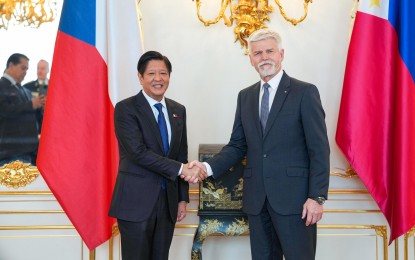
STRONGER TIES. President Ferdinand R. Marcos Jr. (left) meets with Czech Republic President Petr Pavel at the Octagon Hall in Prague Castle on Thursday (March 14, 2024). The two leaders explored opportunities for stronger Philippine-Czech Republic trade and bilateral relations. (Presidential Communications Office photo)
MANILA – President Ferdinand R. Marcos Jr. on Thursday expressed optimism over the possible increased trade and bilateral engagement between the Philippines and the Czech Republic after a fruitful meeting with Czech President Petr Pavel.
In a joint press conference at the Octagon Hall in Prague Castle, Marcos said he had a productive meeting with his Czech counterpart, noting that they explored opportunities for future partnerships in trade and investment, agriculture, green economy and renewable energy, space and aerospace, education, tourism, defense, cybersecurity, and labor, among others.
The President said he also emphasized his government's success in pump-priming the economy and making it an “attractive destination” for Czech investments in the areas of IT-BPM, electronics, manufacturing, food and agriculture, and automotive/ EV manufacturing, among others.
“I am optimistic that we will be able to attract more Czech traders and investors to do business with the Philippines as a result of this increased engagement between our respective business sectors,” Marcos said.
He said he is also looking forward to the second meeting of the Philippines-Czech Republic Joint Committee on Economic Cooperation (JCEC) in Manila later this year.
Czech Republic backs PH in SCS
Meanwhile, the two leaders also agreed that a free and open South China Sea (SCS) is in every nation’s interest, noting the importance of the region in global trade.
“As to South China Sea, we fully support the Philippines when it comes to their entitlement to free movement of goods, and also very intense support because that’s a principle that, not only we all respect but, which also secures global and regional stability,” Pavel was quoted as saying in a statement by the Presidential Communications Office.
“And to us, South China Sea may seem to be far, far away, but if you take into account the percentage of share of world or global trade that passes through this area, any disruption of these routes would have an adverse impact on Europe, not only in the form of shortage of goods but also soaring prices, which is why we have to pay attention to this topic.”
Marcos said the country would continue to deal with the territorial row “through diplomacy and dialogue” despite China’s continued aggression in the disputed waters.
“I underscored that the Philippine position on the South China Sea remains consistent, clear, and firmly anchored on the 1982 United Nations Convention on the Law of the Sea,” he said.
He also thanked Pavel for the Czech Republic’s support as a "like-minded partner, in upholding peace, stability, and the rules-based international order."
More Filipino workers in Czech Republic
During their meeting, Marcos also mentioned the Czech Republic’s decision to increase the quota for Filipino workers entering their country starting in May 2024.
“I took note of the Czech Republic’s announcement that you have increased the quota for Filipino workers from 5,500 to almost double that from January 2024 to 10,300 per year starting in May of 2024,” the President said.
The two leaders also witnessed the signing of the Joint Communiqué on Labor Consultations Mechanism, enforcing a mechanism on the proper procedure for employing Filipino citizens in the European nation.
The Czech Republic is home to more than 7,000 Filipinos working in the processing industry, automotive, repairs and appliances, manufacturing, IT communications, real estate, health/wellness, and household service work.
Marcos is in Prague upon the invitation of Pavel to strengthen the bilateral cooperation and multilateral partnership between the Philippines and the Czech Republic.
Advancing national interest
House Speaker Martin Romualdez lauded Marcos for securing Czech Republic's support as another triumphant achievement in statecraft that would bolster the Philippines' stance on the West Philippine Sea.
Romualdez, who is part of Marcos' official delegation in the Czech Republic, said garnering Pavel's support, particularly in respecting rules-based order and ensuring free and open navigation in the area, would also amplify the "international voice" dismissing China's sweeping claims over the area.
“The exceptional diplomatic efforts of President Marcos paid off with the expression of full support of President Pavel to the stance of the Philippines in defense of our right and sovereignty in the West Philippine Sea,” he said.
Romualdez said the results of the bilateral meeting would significantly enhance the country's defense capabilities as the two countries explored ways to strengthen cooperation in defense, cybersecurity, and modern technologies.
“Such cooperation can bolster the Philippines' defense capabilities, enhance maritime security in the region, and contribute to deterring potential threats to our sovereignty and territorial integrity in the West Philippine Sea,” he added.
Romualdez said Czech defense companies can help the Philippines in advancing the Re-horizon 3 phase of the Revised Armed Forces of the Philippines Modernization Program, which focuses on improving the military's archipelagic defense capabilities with the acquisition of more ships, aircraft and radar systems.
Cooperation in the field of cybersecurity, he said, is also equally crucial in fortifying the country’s defense capabilities, especially in an interconnected world.
“In today's interconnected world, cybersecurity is a critical component of national security. Strengthening cybersecurity capabilities can help safeguard both countries' critical infrastructure, protect sensitive information, and mitigate the risks posed by cyberattacks, including those originating from state-sponsored actors,” Romualdez said.
In terms of the use and development of modern technologies, Romualdez said achieving cooperation in this area benefits both the Philippines and the Czech Republic in various sectors, including defense, telecommunications, and innovation.
“Advancements in modern technologies such as AI, surveillance systems, and communication networks can enhance the Philippines' capabilities in maritime domain awareness, intelligence gathering, and disaster response, which are particularly relevant in the context of the South China Sea,” he said. (PNA)
